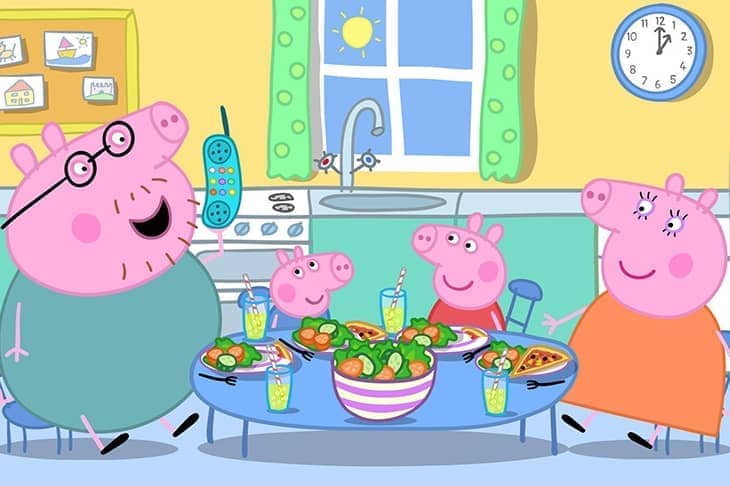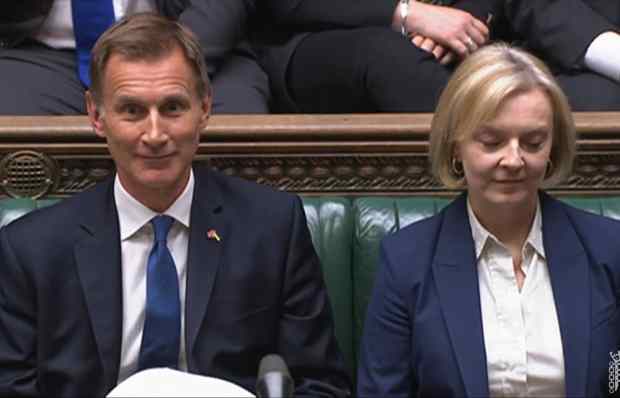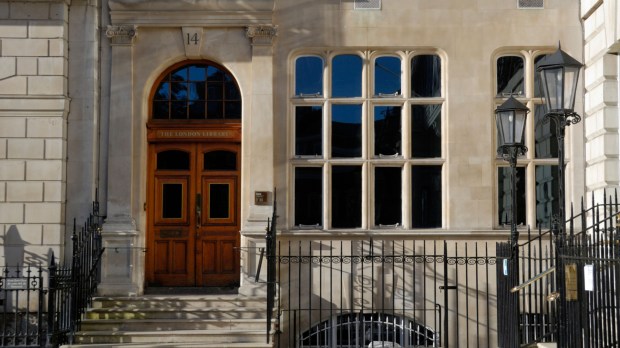I like to think that Boris Johnson’s rambling performance at the CBI this week was a satire against the organisation which he (rightly) dislikes. But I may well be wrong: it is equally likely to have been a Johnsonian cock-up. Either way, he did well to get memorably on the right side of Peppa Pig, whom he turned into an emblem of unlikely British export success. Peppa and her family speak politely in the traditional English accent which foreigners much prefer to Estuary, and do amiable things like making Daddy Pig bicycle to work to avoid disturbing a spider’s web on his car. Peppa is particularly influential in our own household because she has a younger brother called George whom she forces to play along with her fantasies. Our three-year-old grand-daughter has a one-year-old brother, and the house echoes to the sound of her imitating the Pig children’s merry laughter and frequent oinks, with her brother doing his best to keep up. The only television rival for her favour is a fairly dire Canadian series called PAW Patrol. It is good that the Prime Minister is firmly backing the British product. In a little-noticed aside in his speech, however, he did complain that Daddy Pig is ‘a bit stereotypical’. This is true. Daddy Pig is a friendly fellow, but slightly fat and slovenly, considered ‘silly’ by his children. His besetting vice (e.g. saying he will hang a picture on the wall or rescue a kite from a tree) is that he over-promises but under-delivers.
Next week, the Centre for Media Monitoring publishes its report on ‘British Media Coverage of Muslims and Islam 2018-2020’. Its launch webinar will be addressed by, among others, Mark Easton of the BBC, Alison Phillips, editor-in-chief of the Mirror,and Emma Tucker, editor of the Sunday Times. The CfMM, run by Miqdaad Versi, is a project of the Muslim Council of Britain (MCB) which, though arguing there is no one Islam, tries to insist that all media coverage of the subject must have its approval. The MCB’s stance is much more Islamist (i.e. advocating political Islam) than that of most Muslims, but it tries to act as gatekeeper for all media access to Islam. Miqdaad devotes the CfMM’s energies to relentless complaints to the regulator Ipso and others about stories which expose iniquities involving Muslims. He lobbies for special treatment of Muslim subjects and claims group rights to take action against alleged discrimination in ways which would make a free press impossible. So why are representatives of the free press sharing his platform? This is particularly strange in the case of Emma Tucker, since Miqdaad has targeted Andrew Norfolk and Dominic Kennedy, two brave reporters on her sister paper, the Times, of which she was until recently the deputy editor. Norfolk, for example, incurred great hostility for his exposure of the sexual exploitation of young girls in Rotherham by Muslim men of Pakistani heritage. Muslims, like all believers nowadays, often have just cause for complaint about secular ignorance of their religion, but Miqdaad’s CfMM is something else — an unrepresentative attempt to decide what we are allowed to read about Islam and its followers.
There should have been much more coverage of the recent death of F.W. de Klerk, the last white South African prime minister. I found him fascinating because he wasn’t. I interviewed him at length for my Thatcher biography. Nothing he said was memorable yet everything was sound, consistent and helpful. Rather than being a prophetic outlier, he was an exact expert in what the political market will bear. Had he not positioned himself so carefully within his tribe, it would never have trusted him to make the necessary change. Such unspectacular people usually make the best politicians. They deserve more attention; but perhaps if praise were heaped upon them it would go to their heads, and they would lose their efficacy.
On Tuesday, Jordan Peterson gave a public lecture in Cambridge, attended by more than 200 people, watched over by the university proctors in full fig. He spoke about the problem of perception — how we see the world around us, a classic question for intellectual inquiry. There was no trouble. It is astonishing to think that Peterson had his visiting fellowship there rescinded a couple of years ago. All that was ever needed was this simple upholding of free speech rights by the university authorities.
I recently returned from a trip to the United States, where we were filming a television documentary about the Reagan/Thatcher relationship for the BBC. The highlight of the trip was the Reagan Library in Simi Valley, California. Each US president sets up his own library (we would say archive) in his home state. The Reagan Library must be the most spectacular. Its construction was unusual. Reagan’s Air Force One, whole and entire, was moved into position on the rocky hills, and then the building was erected round it. His Oval Office and its furniture are reproduced full-size and, because the replica is too precious to enter, a two-thirds-size replica of the replica is also in place, so that visitors may sit in the presidential chair etc. My great privilege was to be allowed to see, though not to touch, the manuscript diary which Reagan kept throughout his presidency. Movingly, he describes being shot by a lunatic called John Hinckley Jr, who thought assassination would attract the amorous attention of Jodie Foster. In a hand still unsteady from the after-effects, Reagan writes good-humouredly of how he thought at first that his chest hurt because his security man had jumped on him to protect him and had broken his ribs. Only as he reached the hospital did he realise a bullet had got him.
Nearly 25 years later, Ronald Reagan died of natural causes. His grave looks out upon the distant Pacific. As the strong sun dipped behind the lesser hills, the film crew and I sat beside it and gazed, as did Keats’s stout Cortez and all his men, silent upon a peak in Darien.
Got something to add? Join the discussion and comment below.
Get 10 issues for just $10
Subscribe to The Spectator Australia today for the next 10 magazine issues, plus full online access, for just $10.
You might disagree with half of it, but you’ll enjoy reading all of it. Try your first month for free, then just $2 a week for the remainder of your first year.















Comments
Don't miss out
Join the conversation with other Spectator Australia readers. Subscribe to leave a comment.
SUBSCRIBEAlready a subscriber? Log in